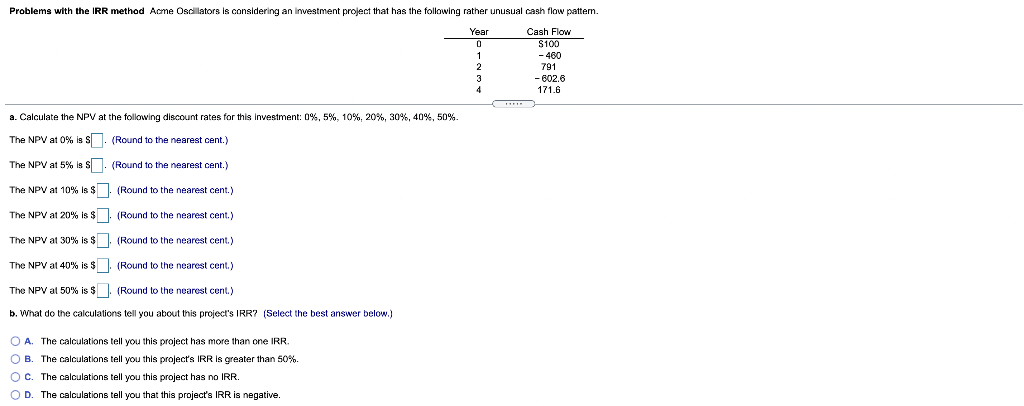

Problems with the IRR method Acme Oscillators is considering an investment project that has the following rather unusual cash flow pattern. Year Cash Flow 0 S100 1 - 460 2 791 3 - 602.6 171.6 a. Calculate the NPV at the following discount rates for this investment: 0%, 5%, 10%, 20%, 30%, 40%, 50%. The NPV at 0% is S. (Round to the nearest cent.) The NPV at 5% is 8. (Round to the nearest cent.) The NPV at 10% is $ (Round to the nearest cent.) The NPV at 20% is $ (Round to the nearest cent.) The NPV at 30% is $ (Round to the nearest cent.) The NPV at 40% is $ (Round to the nearest cent.) The NPV at 50% is $. (Round to the nearest cent.) b. What do the calculations tell you about this project's IRR? (Select the best answer below.) O A. The calculations tell you this project has more than one IRR. O B. The calculations tell you this project's IRR is greater than 50%. OC. The calculations tell you this project has no IRR. OD. The calculations tell you that this project's IRR is negative. The IRR rule tells managers to invest a project's IRR is greater than the cost of capital. If Acme Oscillators' cost of capital is 8%, should the company accept or reject this investment? (Select the best answer below.) O A. The IRR rule says that the firm should accept the investment if the IRR exceeds the cost of capital. However, in cases with multiple IRRs, one IRR may be greater than the cost of capital, while another is lower. In such a situation, it is not clear whether to accept or reject the project. B. The IRR rule says that the firm should accept the investment if the IRR is less the cost of capital. However, in cases with multiple IRRs, one IRR may be greater than the cost of capital, while another is lower. In such a situation, it is not clear whether to accept or reject the project. O C. The IRR rule says that the firm should accept the investment if the IRR exceeds the cost of capital. However, in cases with multiple IRRs, one IRR may be greater than the cost of capital, while another is lower. such a situation, the project should always be accepted. D. The IRR rule says that the firm should accept the investment if the IRR exceeds the NPV. However, in cases with multiple IRRs, one IRR may be greater than the cost of capital, while another is lower. In such a situation, the project should be accepted if the NPV is greater than 0. c. Notice that this project's greatest NPVs come at very high discount rates. Can you provide an intuitive explanation for that pattern? (Select the best answer below.) A. The largest cash outflow (-602.6) occurs in year 3. Other things equal, a change in the discount rate will have a larger impact on present value when the outflow or inflow occurs further into the future. B. With a 50% discount rate, for example, the present value of the $ - 602.6 outflow is only - 178.55 (29.6% of the undiscounted outflow). In contrast, with a 5% discount rate, present value is - 520.5485 (86.4% of the undiscounted outflow). C. There is not intuitive explanation when there are multiple IRRs. OD. A and B provide an intuitive explanation








